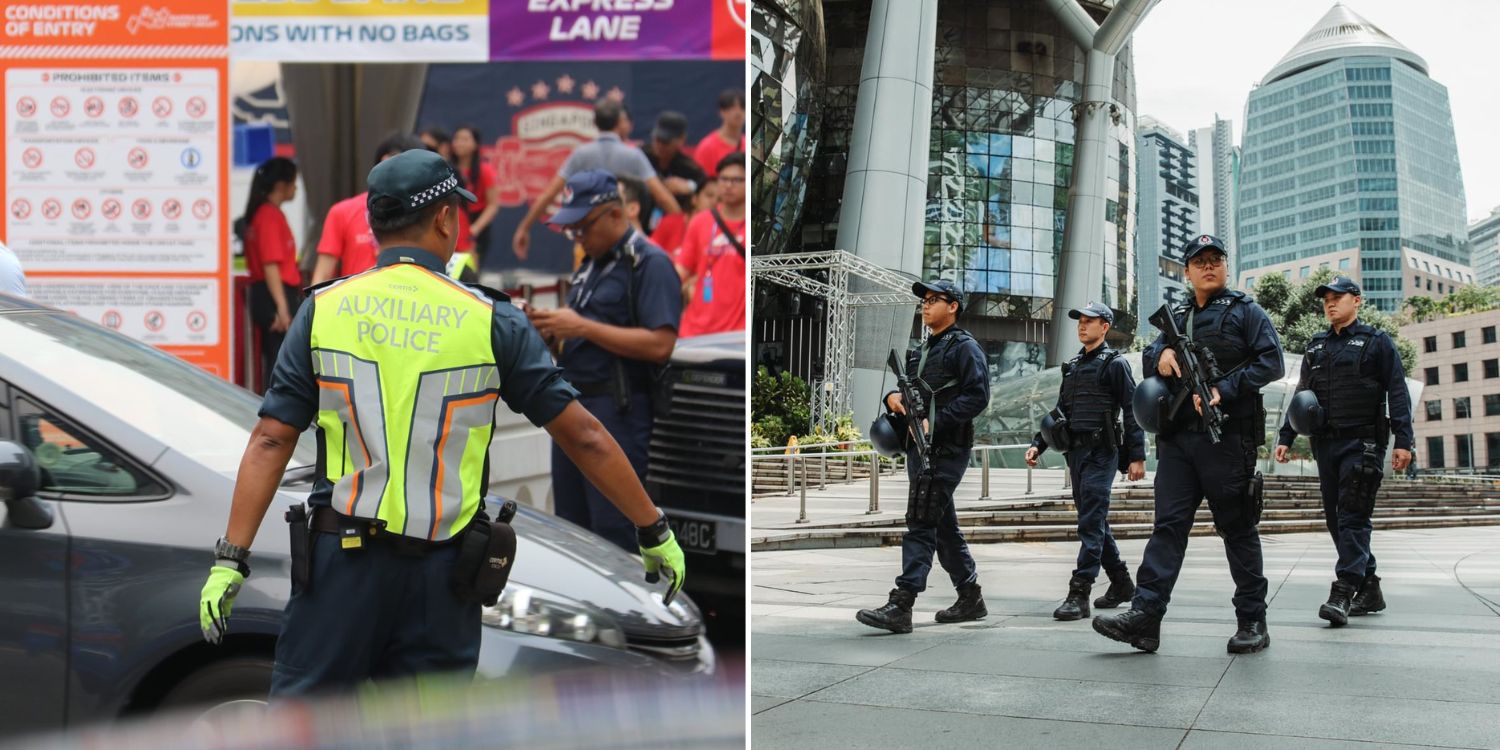How Do Auxiliary Police Officers Differ from Normal Police Officers?
Singapore’s uniformed officers are instrumental in keeping crime off the streets.
This includes those employed by the Singapore Police Force (SPF), and also the Auxiliary Police Force (APF).
While officers from the two forces may have similar uniforms, there are some key differences that set them apart.
For instance, while SPF is the main agency tasked with maintaining law and order in Singapore, auxiliary police officers (APOs) are under the employment of private companies.
They are granted a certain degree of police-like powers and law enforcement authority. This means APOs can be armed, carry out searches, and make arrests — only when duty calls.
APOs are key in supplementing police work, and typical duties include crowd control, protection of major installations, security screening and traffic regulation.
MS News speaks to some APOs, including a former police officer, to understand how they keep Singapore safe.
Auxiliary officers not all too different from regular police
In Singapore, APOs are hired by the Auxiliary Police Forces (APFs) such as the Certis Group and Aetos Holdings.
MS News understands that all officers have to undergo and clear stringent security checks by the Police Licensing & Regulatory Department (PLRD) before they can be hired as APOs.
In the case where auxiliary police officers have been mobilised, they have the same powers and duties of a regular police officer.
For example, they can carry out searches and make arrests. If necessary for the task, these APOs will also carry firearms.
“Similar to police officers from the Singapore Police Force, we are trained and carry firearms and other equipment to help us in our roles, which will help us to suppress or deter unlawful behaviour and actions from taking place,” said 34-year-old Sergeant (APF) Yong Eng Sean, who joined Certis in May 2017.
APO secures Supreme Court building after leaving office job
Prior to joining Certis, Sgt Yong was an administration executive in a trading company before looking for a more engaging and exciting career.
As an APO, she is part of the team that secures Singapore’s Supreme Court.
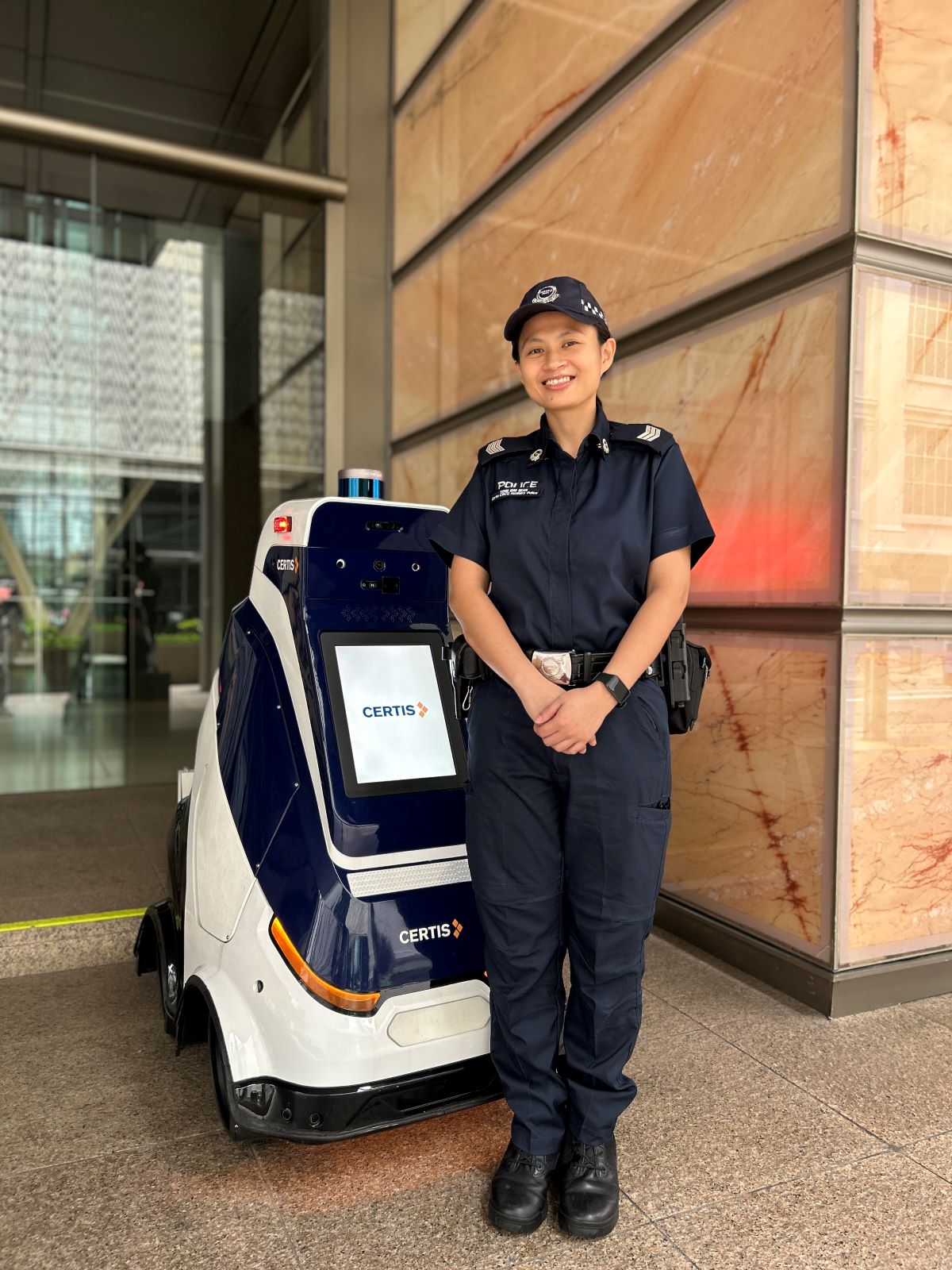
Photo courtesy of Certis.
Her work requires her to be constantly vigilant to ensure everyone’s safety during the court proceedings and that all court users follow strict court rules.
“The mood in court can sometimes be tense, and we have to be alert constantly to react quickly when necessary to maintain law and order,” she added.
Apart from being present inside the courtroom during proceedings, she also oversees access control and security screening of court visitors and attendees.
Throughout her career, she has also been activated for ad hoc assignments and events. These include the National Day Parade, Singapore F1 Grand Prix, and Istana Open House events, to name a few.
Differences between regular & auxiliary police
However, there are some key differences between regular and auxiliary police.
31-year-old Inspector (APF) Jimmy Ng Jun Ming of Aetos shared with MS News that there are notable distinctions in their roles.
Having served as a police officer with the SPF for nine years, he made a switch in May 2022, joining Aetos as a Senior Auxiliary Police Officer (SAPO).
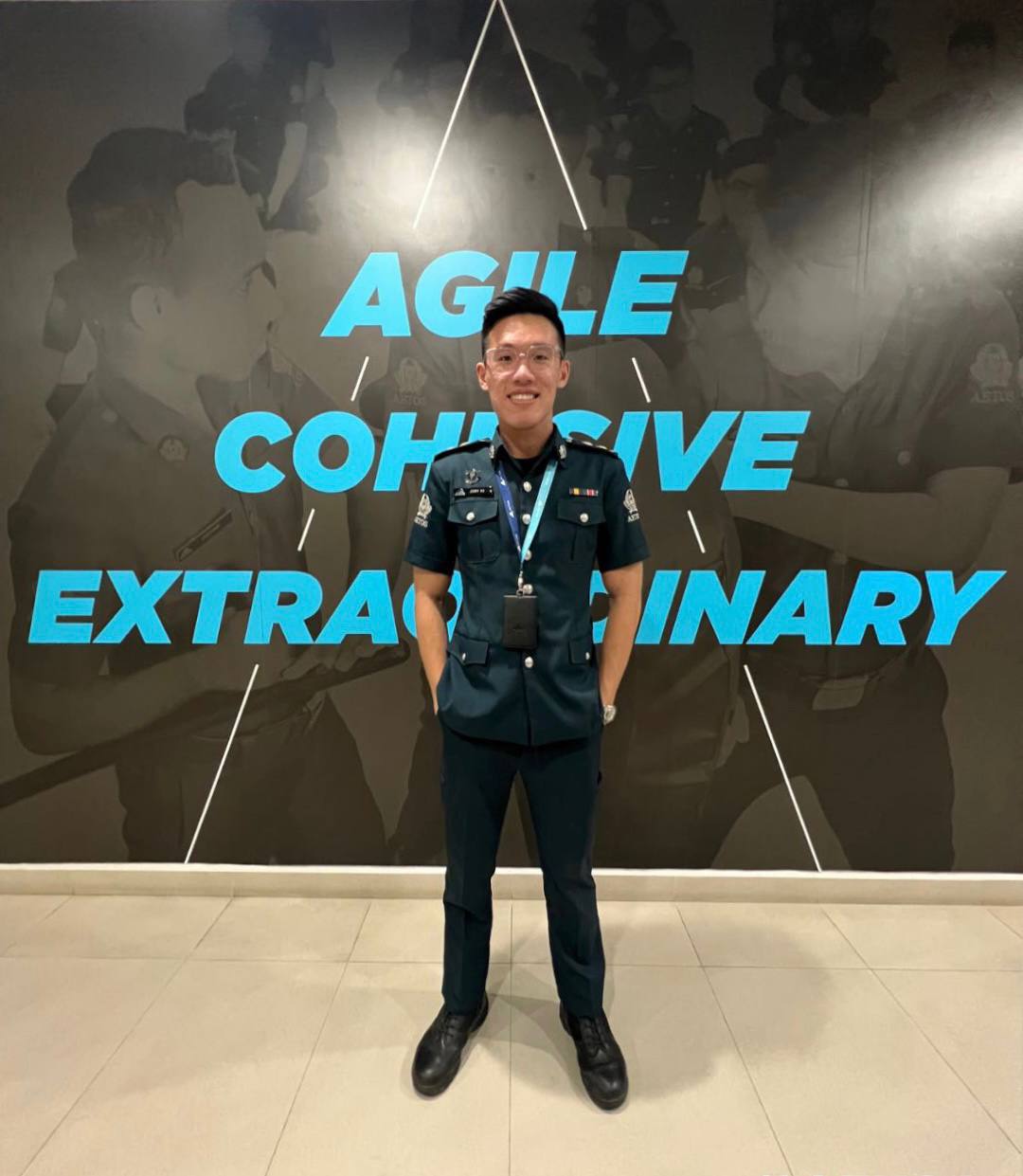
Photo courtesy of Aetos.
Prior to to his shift, he was a Ground Response Force officer at Kampong Java Neighbourhood Police Centre under the Tanglin Division.
Insp Ng noted that APOs serve both the community and their clients.
The latter include external organisations and government agencies who engage APOs for security services.
“Unlike regular POs [police officers] who address broader public security and safety concerns, we focus on providing unified security solutions for both our clients and communities,” he said.
In Singapore, police officers oversee law and order, criminal investigations, counter terrorism and community policing. An APO’s job scope typically does not involve investigations into crimes.
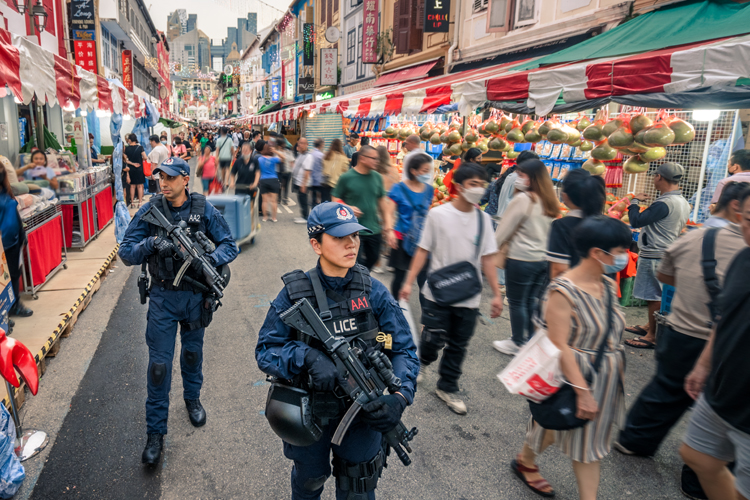
Source: Singapore Police Force
Additionally, police officers can exercise their powers at all times.
APOs, however, only have the same powers as regular officers during the limited time of their duty.
Though APOs can arrest individuals, they can only do so for arrestable offences committed in their view or presence.
In the case where the arrestable offence was not committed in their presence, they may require the suspect to provide their particulars. This is only when the offence has been reported to the APO.
If the suspect fails to comply, the APO may detain the subject until the police arrive. The suspect must then be handed over to the regular police officer.
Admiration for APO’s role inspired former police officer to switch paths
Insp Ng said he developed a sense of respect for Aetos APOs while he was a police officer.
“Witnessing their dedication and hard work every day further deepened my understanding and appreciation for the crucial role that APOs play in securing our nation,” he said.
That’s also a big reason why he decided to make the career change.
“I knew I wanted to step out of my comfort zone and take on a more challenging role; one that provides progressive opportunities as I continue to fulfil my passion as a law enforcement officer,” he shared.
As a SAPO, he supports the Commanding Officer in a number of critical functions. These include planning, training, logistics and operations within the division.
APOs trained with additional skillsets beyond law enforcement
So what does training look like for APOs?
MS News understands that Certis APOs go through regular training on soft skills such as customer service and engaging people with disabilities.
This is on top of the hard skills training that includes law and procedures, police contact tactics, crowd control and handling of firearms.
Additionally, they are trained in the use of technology such as body-worn cameras and smart operations handheld devices.
For Certis APOs, virtual reality and simulators are also a part of the APO training.
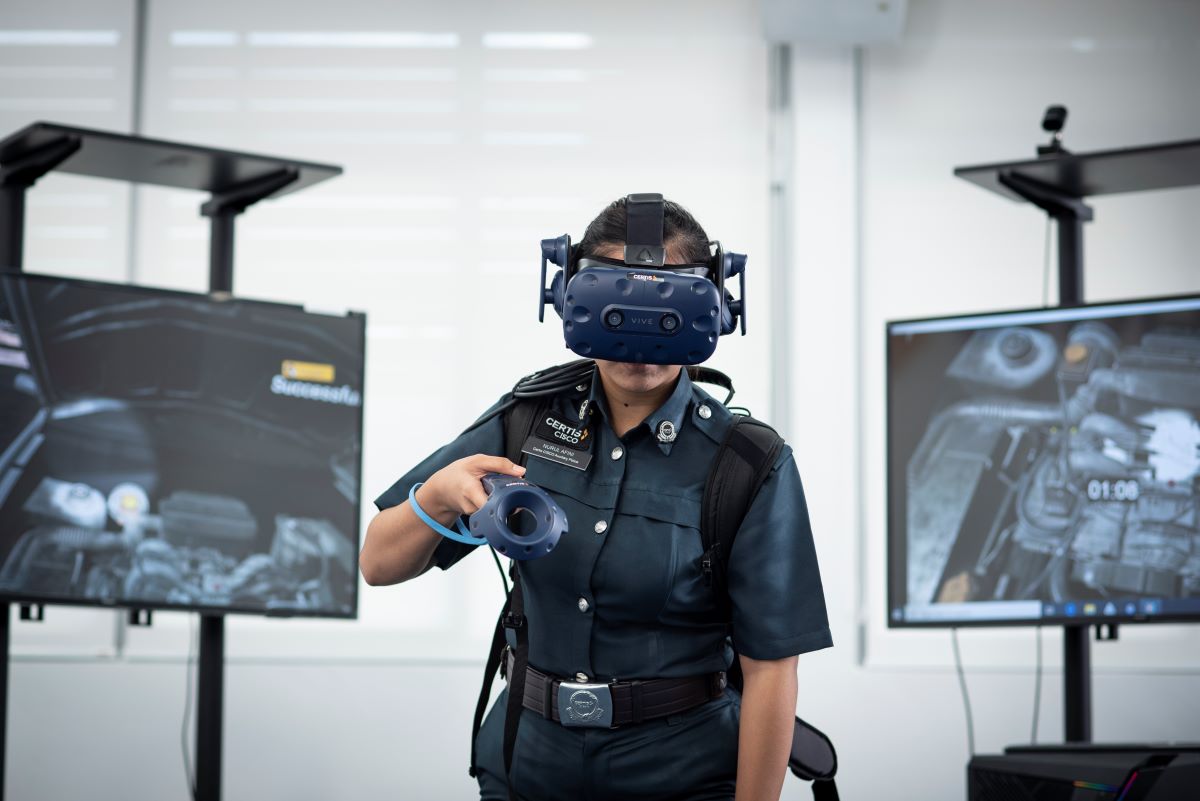
Photo courtesy of Certis.
“In my experience transitioning from an officer in SPF to Aetos, I found the training for both roles to be quite similar,” said Insp Ng of Aetos.
He noted that APOs must undergo the same intensive training as SPF officers.
This comprises essential components such as IPPT (Individual Physical Proficiency Test), firearms handling, law lessons, threat identification and incident management, among others.
Oftentimes however, the training curriculum for APOs also includes skills relevant to the private security sector.
For Aetos APOs, these include leadership development courses and customer service training.
“While there are similarities in core training components, the training I underwent as an APO at Aetos is specifically tailored to address our diverse responsibilities, as we collectively safeguard our nation with the Home Team,” said Insp Ng.
APOs play a key role in keeping the community safe
Speaking to these officers, it becomes clear that APOs and police officers do not work in silos.
Sergeant (APF) Muhammad Azri Azmian, 33, similarly shared that APOs often work very closely with the police.
“Auxiliary police officers also support businesses and various government agencies for adhoc commercial assignments such as guarding, escorting, traffic and access control,” he added.
Sgt Muhammad Azri is part of the team that manages the security of the Singapore Armed Forces’ (SAF) Multi-mission Range Complex, an indoor live firing range.
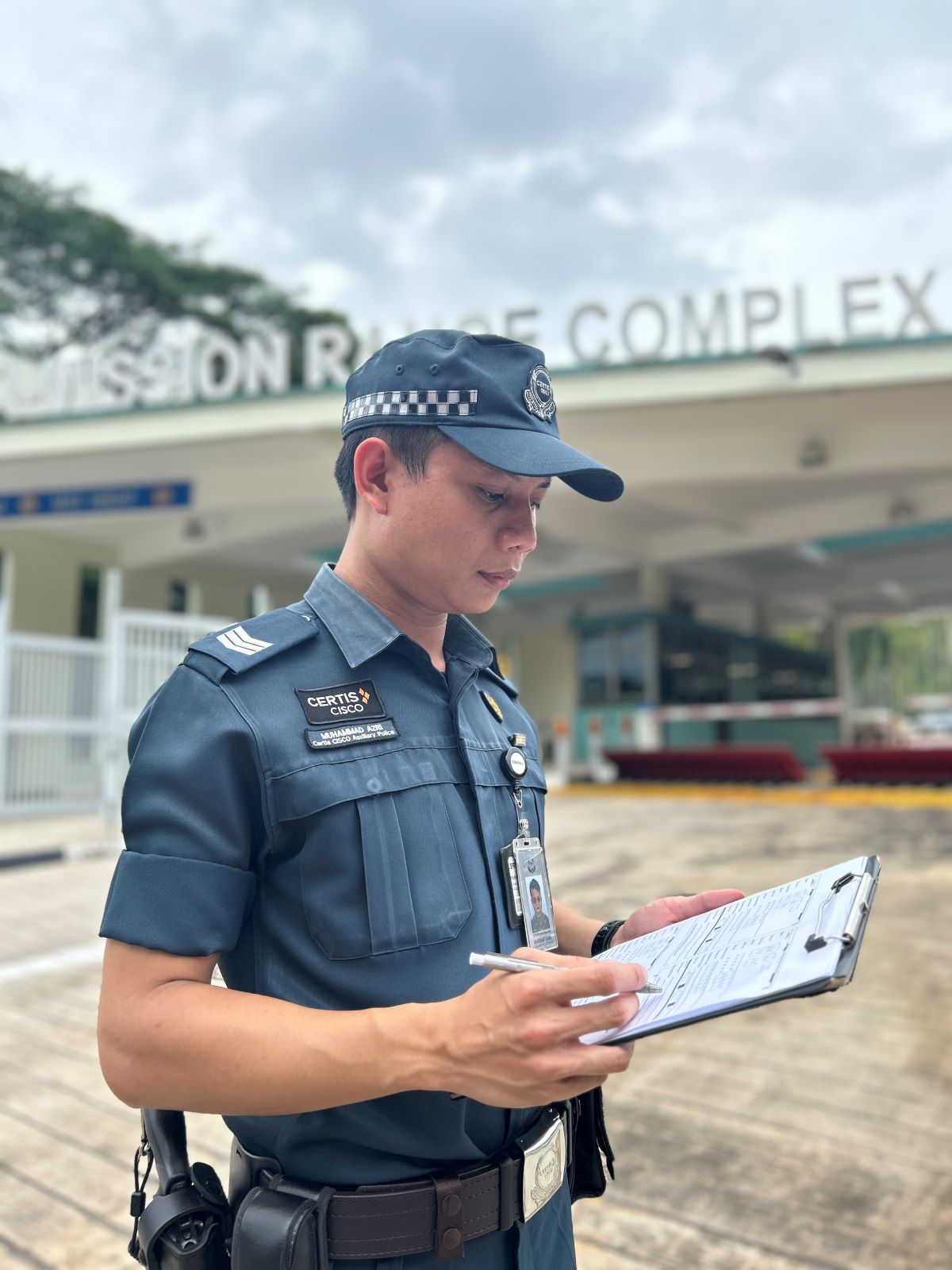
Photo courtesy of Certis.
Most importantly though, both APOs and police officers have the common objective of serving and keeping the community safe.
Both roles require officers to think on their feet and make quick, calculated decisions on the ground, he said.
Recalling an instance when a casualty had suffered a heart attack, he said this required an emergency evacuation, adding: “We worked with SCDF to facilitate the access route with minimal obstacles for a swift evacuation, which eventually helped save a life.”
How to become an APO in Singapore
In January, Home Affairs Minister K Shanmugam shared in a written response that Singapore faces an increasing demand for security services.
However, there’s also a shrinking local workforce. 68% of APOs in Singapore are local as of November 2023.
Like other companies, APFs such as Certis and Aetos do publicise their available job postings on their sites.
A check by MS News on the Certis website for an APO promises a monthly salary of up to S$3,900.
There is also a joining bonus of S$35,000. The position is also for Singaporeans only.
Meanwhile, Aetos is offering a gross salary of up to S$5,200 with a bonus of up to S$25,000.
Ideal candidates for both positions should be physically fit, and have at least minimum 3 GCE ‘N’ Levels, among other requirements.
For individuals such as Sgt Yong, becoming an APO was a viable career switch from her seven-year career as an administrative executive.
“I think it is not easy to manage security and making sure that customers and the public feel at ease at the same time,” she said.
“I also think that with the training and equipment I get, I have the ability to make a difference when the need arises.”
Also read: S‘pore May Allow Hiring Of Auxiliary Police Officers From China, India & The Philippines
S‘pore May Allow Hiring Of Auxiliary Police Officers From China, India & The Philippines
Have news you must share? Get in touch with us via email at news@mustsharenews.com.
Featured image adapted from Certis on Facebook and Singapore Police Force on Facebook for illustration purposes only.

Drop us your email so you won't miss the latest news.
